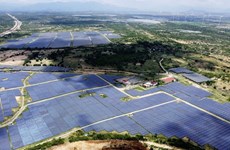Policy challenges for middle-income economy
Domestic and foreign economic and banking experts have shared their
views on addressing and dealing with policy challenges in Vietnam’s
transitional period to a middle-income economy.
Domestic and foreign economic and banking experts have shared their
views on addressing and dealing with policy challenges in Vietnam’s
transitional period to a middle-income economy.
Addressing a workshop in Hanoi on Mar. 14, State Bank of Vietnam Vice Governor Le Minh Hung said that Vietnam is facing inflation, a trade deficit, exchange rate fluctuations, public debt, along with difficulties in the economic structure of a new middle-income nation, and the middle-income trap.
In tandem with the Government’s strong macro-economic policies to curb inflation and maintain macro-economic stability and social welfare, the SBV operated a tight monetary policy, contributing to successfully implementing the set targets, he said.
The workshop, held by the State Bank of Vietnam and the International Monetary Fund (IMF), offered a forum for participants to share international experience on managing monetary policy, strengthening budget management and conducting the restructuring of financial areas and state-owned businesses.
Highlighting elements impacting on Vietnam’s inflation and monetary policy, IMF experts provided recommendations that SBV needs to be given a clear and more independent role to pursue the goal of price stability; the use of administrative management measures on interest rates, credit growth and grants should be gradually eliminated; and an interest corridor should be established as an important tool in monetary policy.
Yin Sze Liew from Singapore’s monetary management agency expressed his concern about Vietnam ’s inflation. He also pointed out shortcomings, such as low efficiency of policies, high dollarisation and ambitious targets for restructuring.-VNA
Addressing a workshop in Hanoi on Mar. 14, State Bank of Vietnam Vice Governor Le Minh Hung said that Vietnam is facing inflation, a trade deficit, exchange rate fluctuations, public debt, along with difficulties in the economic structure of a new middle-income nation, and the middle-income trap.
In tandem with the Government’s strong macro-economic policies to curb inflation and maintain macro-economic stability and social welfare, the SBV operated a tight monetary policy, contributing to successfully implementing the set targets, he said.
The workshop, held by the State Bank of Vietnam and the International Monetary Fund (IMF), offered a forum for participants to share international experience on managing monetary policy, strengthening budget management and conducting the restructuring of financial areas and state-owned businesses.
Highlighting elements impacting on Vietnam’s inflation and monetary policy, IMF experts provided recommendations that SBV needs to be given a clear and more independent role to pursue the goal of price stability; the use of administrative management measures on interest rates, credit growth and grants should be gradually eliminated; and an interest corridor should be established as an important tool in monetary policy.
Yin Sze Liew from Singapore’s monetary management agency expressed his concern about Vietnam ’s inflation. He also pointed out shortcomings, such as low efficiency of policies, high dollarisation and ambitious targets for restructuring.-VNA













